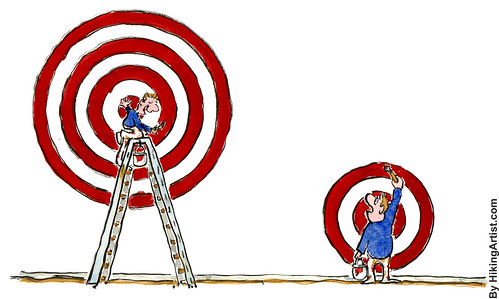
One of my tenets is this: life is too short to waste it dealing with poisonous people and having toxic relationships.
If you believe you may have one or more toxic relationships in your life, then one of the key people skills for you to master is recognizing and managing such relationships.
In my work as a communication coach, I often help my clients navigate through and beyond toxic relationships. I can tell you than acquiring the proper skills and attitudes to do this is not an easy process, but if you share the above tenet with me, you’ll definitely find in worth your while.
Toxic Relationships Signs
Toxic relationships can be present in any area of your life. You may have a toxic relationship with your spouse, your GF/BF, your parents, your boss, a friend, a colleague or a business partner.
Before anything else, you need to be able to look the monster in the eye and name it. In other words, you need to recognize toxic relationships and acknowledge them if they exist in your life. The following are in my view the top five signs of a toxic relationship:
1. Lack of balance. One person gives, the other receives. One person invests, makes sacrifices and compromises for the sake of the relationship, the other person takes, expects and demands compromises.
2. Heavy criticism. Any relationship where at least one partner spends significantly more time criticizing, accusing and putting down the other partner than praising and supporting him or her is a toxic relationship.
3. Emotional manipulation. If in a relationship you often feel pressured to do certain things, if the other person frequently uses shame, guilt, fear or anger as tools to push your buttons and direct your behavior, you’re in a toxic relationship.
4. Persistent anxiety. Your mood while interacting with a person is a good sign of the dynamic that relationship has. If you frequently feel anxious or tense while interacting with a person, or even just thinking about it, the relationship is toxic.
5. Disrupting your growth. Healthy relationships help every area of your life flourish. Toxic relationships do the exact opposite. Toxic relationships in your family life make you unfocused and unproductive at work; toxic relationships in your career make you distant and cranky when at home.
Measure any relationship based on these five signs and you’ll get a pretty good idea about the number of toxic relationships in your life. Once you discover any, the next step is to decide if the best way to go is to try and save them, or to end them.
Ending Toxic Relationships
Now, once they fully realize they’re in a toxic relationship, many people have the instinctual reaction to try and fix it. They think it is the noble and proper thing to do. After all, we get preached to all the time on how relationships require compromises and we should fight for them.
Well, that may sound dignified, but the fact it that it’s often not the best path to take. Here’s one essential thing I came to realize as a communication coach: most of the time, you’re much better off ending toxic relationships than trying to save them.
It may be emotionally hard to do so, but trust me: in terms of costs and benefits, the best thing you can do is in all probability to end it without even thinking twice.
As a strategy for ending toxic relationships, I typically recommend biting the bullet and going all the way. Don’t try to distance yourself gradually from the other person and to play it all safe. It usually won’t work and it will cause you a whole lot of trouble.
Have a serious discussion with the other person and tell them: “Look! This relationship is not working for me. It’s causing me huge distress. I’m ending it”.
The other person will likely try to fight you on your decision and manipulate you into not ending the relationship. Keep in mind that it’s your choice, that you don’t need the other person’s consent to end the relationship, and stick to your decision.
Fixing Toxic Relationships
OK: if you truly believe that a toxic relationship in your life can be fixed and for some practical reason, trying to save it is a good idea, then by all means go ahead and try and fix it.
The essential concept you need to understand if you walk this path is that toxic relationships are co-created. Thus, saving it can only be done if both parts are willing to change. Overall, saving a toxic relationship involves three key steps:
1. An honest and straightforward expression, by both persons involved, of their needs, wants, opinions and frustrations related to their relationship. Honest, open communication is crucial in the healing process.
2. Acknowledging each others rights and responsibilities. If one person refuses to admit the other person’s needs and wants (often different from theirs) and to take them into consideration, there is no saving for the relationship.
3. Working towards a win-win solution. Once both sides of the story have been expressed, heard and accepted, the two parts need to collaborate to find the mutually advantageous solutions, and to rebuild their relationship based on them.
Effectively handling toxic relationships is not a matter of using a few simple tricks and tricks. It’s a matter of gaining confidence and developing key people skills for building healthy relationships. It’s an inside-out journey that begins with you and ends with your relationships.
Image courtesy of CowGummy
 There is one way to make people like you that’s very popular and I’m adamantly against. That is being really nice with people and doing nice things for them all the time. Sure, you can get some people’s approval be being a
There is one way to make people like you that’s very popular and I’m adamantly against. That is being really nice with people and doing nice things for them all the time. Sure, you can get some people’s approval be being a 





 Nowadays, traveling is highly accessible and it is the favorite pastime of many people. Almost every person out there with a decent income does some long distance traveling every year and has a lot of stories to tell.
Nowadays, traveling is highly accessible and it is the favorite pastime of many people. Almost every person out there with a decent income does some long distance traveling every year and has a lot of stories to tell.